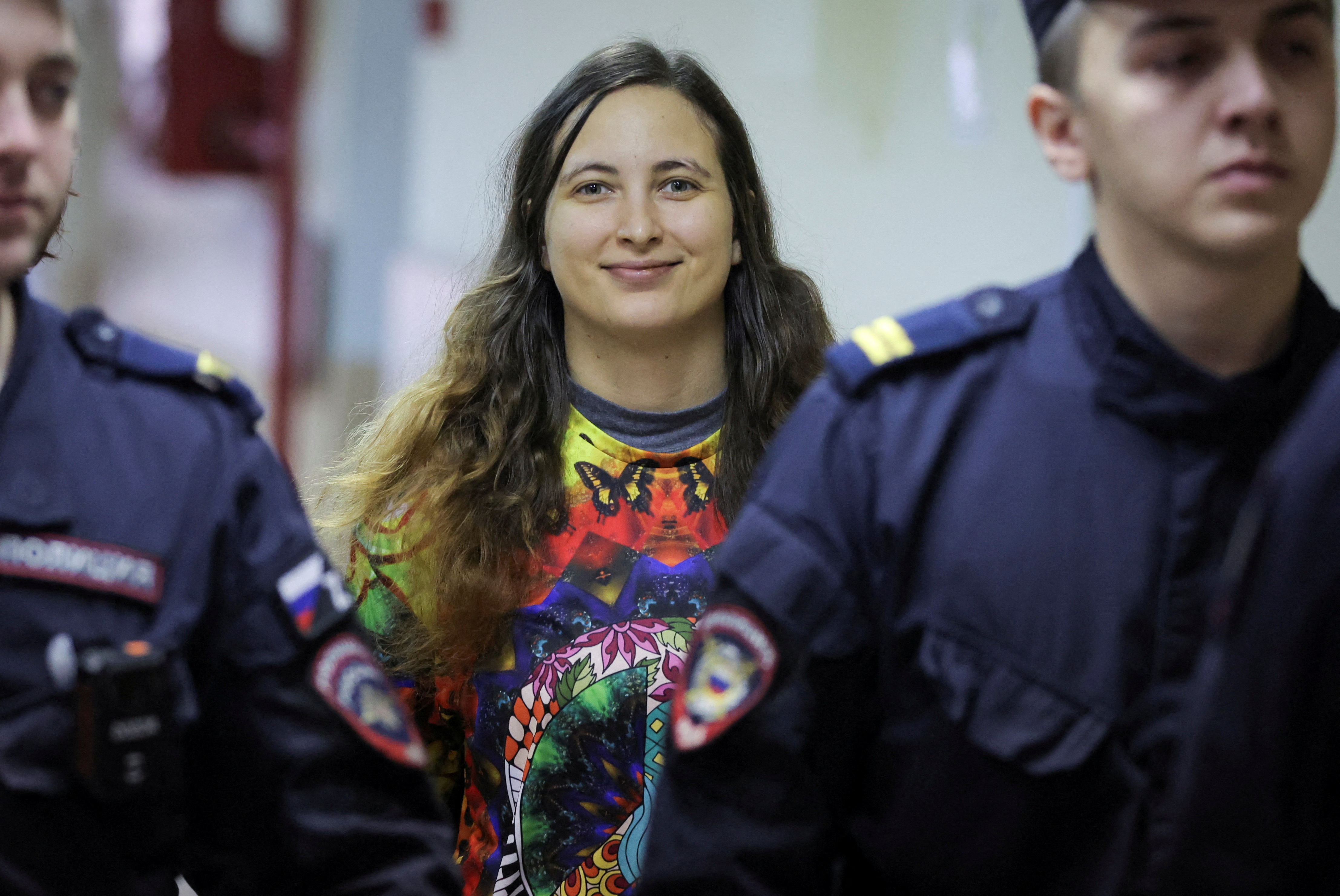
Alexandra (Sasha) Skochilenko, a 33-year-old artist and musician charged with spreading false information about Russia’s armed forces after replacing supermarket price tags with slogans protesting against the country’s military operation in Ukraine, is escorted during a court hearing in Saint Petersburg, Russia November 8, 2023. … Acquire Licensing Rights
Nov 13 (Reuters) – Lawyers for a Russian artist and musician who replaced supermarket price tags with demands for an end to Moscow’s war in Ukraine will on Monday urge a judge to free her after a state prosecutor sought an eight-year jail term.
Alexandra Skochilenko, 33, known to her friends as Sasha, has spent over a year-and-a half in prison in St Petersburg as the Russian legal system deals with her case. Critics say it is part of a crackdown on anyone who speaks out against Moscow’s “special military operation”.
Authorities have detained nearly 20,000 people for anti-war activity and opened over 800 criminal cases against anti-war dissidents, according to the OVD-Info rights group. The justice ministry has designated the rights group a “foreign agent” and its website is blocked in Russia.
Russia tightened its laws on dissent after sending its troops into Ukraine on Feb. 24 last year, deepening its action against critics Moscow regards as unacceptably divisive as the country is locked in what President Vladimir Putin has portrayed as an existential struggle with the West.
Skochilenko replaced price tags in a supermarket in her native St Petersburg on March 31 2022 with five small pieces of paper urging an end to the war.
Less than two weeks later, she was detained after a shopper complained.
Skochilenko denies the formal charge of knowingly spreading false information about the Russian army – an offence punishable in her case by up to ten years.
Her legal team say that for Skochilenko, who was already suffering from poor health before her arrest, a lengthy sentence would be particularly damaging.
Alexander Gladyshev, a state prosecutor, on Wednesday asked a judge to jail her for eight years and ban her from using the Internet for three years, a punishment whose severity shocked Skochilenko, according to supporters.
The prosecution previously accused Skochilenko of committing what it described as a serious crime out of “political hatred” towards Russia.
Her legal team will make their closing arguments to a court in St Petersburg on Monday, when they will say Skochilenko has been punished enough for a protest that was non-violent and that she should be freed.
She will then have a chance to make a final statement to the court before the verdict, which could be delivered later on Monday or in the following days.
‘PRISONER OF CONSCIENCE’
According to the Russian-language Mediazona outlet, she told the court on Nov. 3:
“I just wanted to stop the war – that was my motivation. Not hatred, but compassion. I am sure that every person in this room does not want there to be a war.
“Even you, your honour (the judge), even you, the state prosecutor, you also don’t want people to die prematurely, for young soldiers to lie in the fields, for civilians to die.”
Amnesty International has declared Skochilenko “a prisoner of conscience” – someone who is imprisoned solely because of who they are or what they believe.
Copies of the imitation price tags produced by Skochilenko are on display on a website maintained by her supporters.
One of the tags seen on the website accuses the Russian army of bombing a theatre in the port city of Mariupol where around 400 people were hiding – a charge Moscow said at the time was false.
Another alleges Russia was sending conscripts to fight in Ukraine, which Russia has also denied. A third cites alleged Russian casualty figures and accuses state TV of not talking about them, and a fourth accuses President Putin of lying and speaks of “pointless deaths”.
A fifth reads: “My great-grandfather did not take part in the Great Patriotic War (World War Two) for four years in order for Russia to become a fascist state and attack Ukraine.”
The Kremlin has said it is Ukraine’s leadership, not Russia’s, that has fascist tendencies and that Moscow was forced to send troops into Ukraine to protect Russian-speakers there and stop the creeping expansion of the NATO military alliance, which it says threatened Russia’s national security.
Reporting by Reuters
Writing by Andrew Osborn
Editing by Mark Trevelyan and Barbara Lewis
Our Standards: The Thomson Reuters Trust Principles.